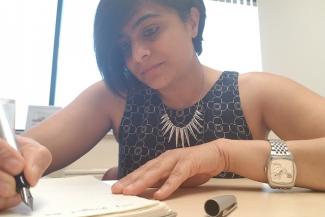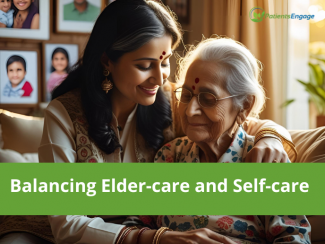
Ekta Hattangady, a Clinical Social Worker with a specialization in Chronic Illness Management talks of the importance of making your own self a priority. Also seven steps to self care.
My cousin was in her late 20s when her mom, my aunt, was diagnosed with late stage cancer. It was a year of a lot of frantic activity and high stress. It was a year of loss. My cousin spent every minute caring for her mom. During one hospital stay for my aunt, my dad happened to be there. He took one look at her and said, “You need to go shower, eat something, take a walk and then come back.” My cousin still remembers that. She admitted to feeling depleted, but she kept pushing herself. She felt guilty taking rest when her mom was dying.
Our Asian cultures are extremely community and family-oriented. We are all about giving and serving others. We often ignore our own health in the process. We push ourselves to succeed at work and be the best parents, friends, community members, etc. Our own needs are often put on the back burner. Women often become adept at managing the health needs of their family members, but don’t think of themselves.
There is a growing sentiment that people need to focus on themselves and engage in self-care. To some it can feel like it is an imported idea, alien even – to take time out for oneself when others need us more. Others may say they do not have the time. Some may feel they are fine because they take frequent holidays and vacations. And some go for massages, night outs, etc. While these are components of self-care, there is a lot more to it.
To put it simply, self-care is caring for our overall well-being. This includes our physical bodies, mental health, social life and spirituality. One way to make our self-care plan is to identify what can we do in each of these realms to support ourselves.

For example, many Asian communities are at high risk for metabolic diseases like diabetes, hypertension, high cholesterol, etc. While genetics are not our fault, we can certainly lower our risk for developing these conditions or delay their onset. Reducing cardiovascular risk is also linked with better brain health and reducing risk for stroke, Alzheimer’s and other dementia.
When put like that, we realize that it’s not just about us.
If we take care of ourselves, we are also supporting our families in the long-term. Even if we already have certain conditions, engaging in self-care can keep us stable, healthy and positive for a long period of time.
Some people may struggle with mental health issues, some with physical. Some have extremely stressful jobs. Some people are caring for children and / or family members living with chronic conditions. Some have simply developed living patterns that don’t support development of positive habits.
Everyone wants to feel healthier and happier. Not everyone knows where to start or how to succeed. I often see folks struggling with a lofty diet or exercise plan. To me, that’s the goal, not the starting point. Lifestyle changes are hard. But taking baby steps helps us in getting stronger, feeling better and ready for the marathon of life.
If you find yourself asking the question, “Do I need self-care?” The answer will be a resounding yes. When was the last time you did something just for yourself? Many of us are doing it sporadically. The idea is to make it a part of our lives.
Seven Steps to Self-Care
- Identify which aspect of your life needs most attention - is it your physical or mental health? Is it your social or spiritual life? Don’t worry. If you start with one, you will see the benefits in other aspects of your life. For e.g. A gratitude journal has an impact on one’s mental health and eventually encourage one to focus on the physical aspects of health as well!
- Identify which activity will help you get started - I was diagnosed with prediabetes in 2018. I chose walking after meals as my activity as a start because I knew it would be easily doable and also has the quickest impact on post meal sugars levels.
- Carve out a time for that activity - Most of us lead busy lives. We have no time. So, here’s where we reflect on what can be removed or modified from our plate for a little bit. Before bedtime? Soon after waking up? Middle of the day?
- Start extremely small to set yourself up for success - One day at a time. One small thing at a time. If it didn’t work today, go smaller, till you have success. During a bad bout of depression, my self-care was to shower three times that week! It may sound ridiculous to some people, but to me, I needed to have an achievable goal and it worked.
- Begin with things you enjoy - If you hate the gym, don’t start with that. I hate cooking, so I didn’t choose making meals as my self-care. That’s a chore. Self-care needs to be inviting and encouraging.
- Reward yourself - with something that won’t undo your self-care. E.g. if you’re trying to quit smoking, don’t reward yourself with anything smoking-related. Or if weight loss or sugar levels are your goal, remember to use small proportions of sweet treats, if that’s something you enjoy.
- Track your progress - How are you feeling mentally? What changes do you see in yourself? What are you hearing from others? Some people keep a journal. Some people use apps to track their progress. But being able to visualize the progress is extremely important.
Adopt an attitude of:
# Forgiveness — change is hard. Consciously forgive yourself for skipping.
# Encouragement — tell yourself you can and will do it.
And remember, self-care is not always about doing things.
Sometimes less is more. If self-care feels like another chore on your to-do list, it’s time to start reducing the things on your list!
Please share your questions and comments with us.
Ekta Hattangady is a Clinical Social Worker with a specialization in Chronic Illness Management. She lives with chronic pain, anxiety and prediabetes and uses exercise, meditation and journaling to not just cope, but also thrive. She is passionate about helping people develop self-care strategies to lead full and balanced lives. Ekta is currently on a 365-day journey of daily meditation to realize her personal power.






